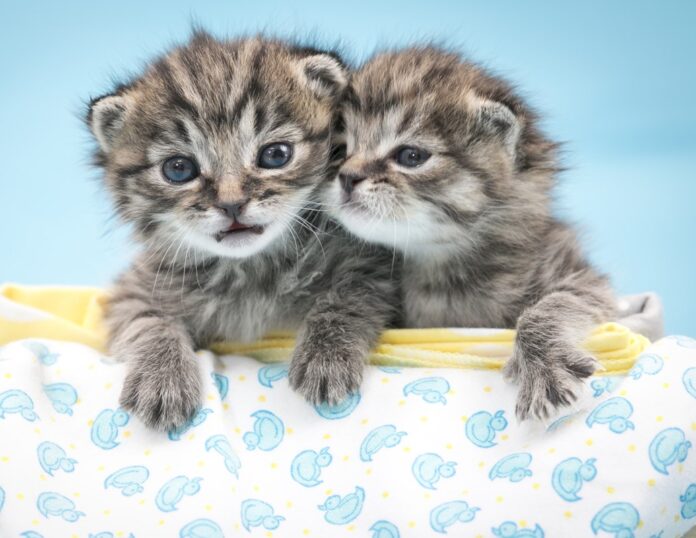By Jackie Noble
Each spring, cute kittens are born at the highest rates of the
year — meaning San Diego Humane Society will soon be at its
busiest! In the coming months, San Diego Humane Society will be the safe haven where thousands of loveable kittens grow and thrive. However, it’s not all cute and “paw-rfect.” Our furry friends require a tremendous amount of resource-intensive, lifesaving care. Shelter staff and volunteers dedicate themselves around-the-clock to giving these kittens the second chance they deserve!
Most orphaned kittens are found and brought to the shelter by good Samaritans with the best intentions. With more kittens popping up in local neighborhoods, it’s important to carefully assess the situation before stepping in and — once you do — use these kitten care guidelines to keep our feline friends safe:
Find a litter? Be a sitter.
Mother cats may leave kittens for hours at a time. If you come across a litter of kittens, it’s likely that mom will return
soon. Wait to intervene until you’re sure the kittens are orphaned, injured or ill. Tip: Place a ring of flour around the kitten nest and monitor it to see if mom is coming and going to care for the little ones. If she’s tending to the babies, you will see her paw tracks in the flour.
Warm kittens are happy kittens.
Young kittens don’t have the ability to regulate their body
temperatures. If you need to intervene, use a heating pad, or wrap them snugly in a warm towel until their temperature
stabilizes. Kittens should be given the ability to move off the
heat source in case they get too hot, and there should always be a blanket or towel over a heating disc to prevent them from
being burned. Helping a kitten stay warm is one of the most important things you can do, and should be your first step. Tip: If a kitten is cold, never try to feed them. It’s important to wait until they’ve warmed up!
Milk does a (kitten’s) body
good.
Kittens are susceptible to disease and infection when they
aren’t benefitting from the antibodies of their mother’s milk.
That’s why using formula specialized for bottle-feeding kittens
is so important. Tip: All kitten formula must be refrigerated and discarded after 24 hours or it will spoil. Contrary to popular belief, cow’s milk is not healthy for kittens and will cause diarrhea.
Weaning to wet food.
At 4 weeks old, a kitten can gradually be introduced to wet
food. Bottle feeding should continue as well since it limits kittens’ stress and ensures equate nutrition. Adding some
formula to the wet food helps make the transition smoother.
Tip: As with all babies, expect a mess! Be sure to clean the
kitten’s face and paws to avoid sores or hair loss from crustedon food.
Squeaky clean kittens.
A clean kitten is safe from debris, urine or feces, which can
all cause skin irritation. Use a washcloth with lukewarm water
to help them tidy up — or, for big messes, wash them gently under running water or in a small basin. Don’t submerge kittens or get water on their head and ears. Tip: Wash kittens with a small amount of Dawn soap or baby shampoo. Rinse them well and follow with a soft blow dry!
Caring for thousands of kittens each year takes a community. Here’s how you can help!
San Diego Humane Society is currently seeking 100 new foster
families to support bottle-feeding kittens! If you’d like to sign
up, visit sdhumane.org/foster. During our annual virtual Kitten Shower, animal lovers can choose to donate a special gift
from the organization’s online baby registries. To learn more
or donate today, visit sdhumane.org/kittenshower.
For other tips on how to care
for kittens, visit San Diego Humane Society’s Found Kitten
Guide.
Noble is an expert in neonatal kittens and shelter programs. In
her role as the Director of Nursery and Placement at San Diego
Humane Society, she oversees all aspects of the Kitten Nursery.














